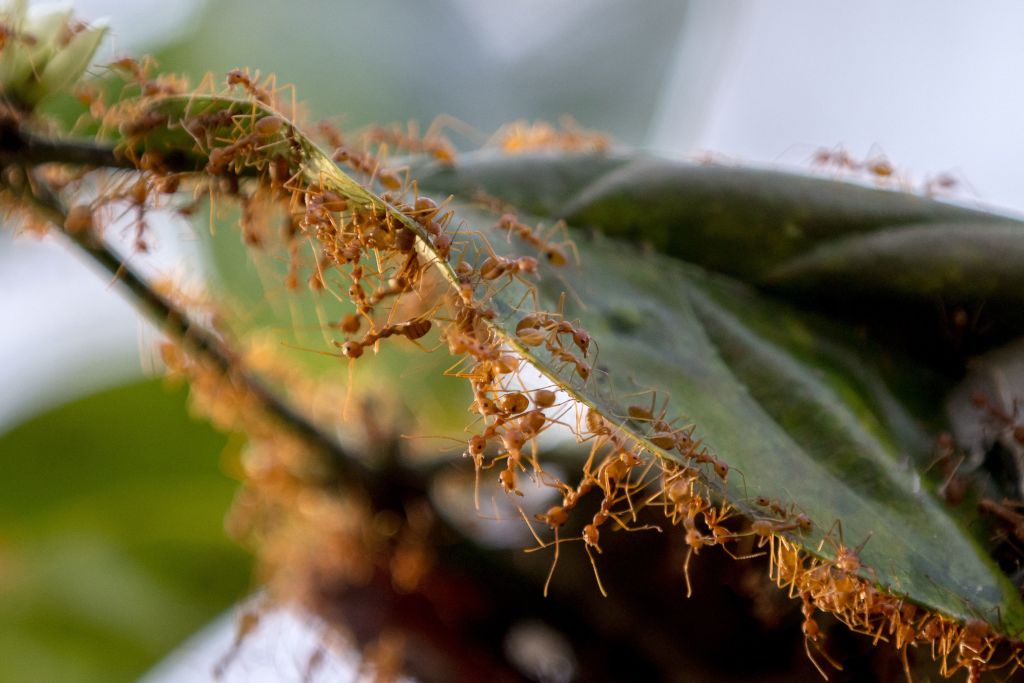Summary of Insect Social Behavior: Farmer Ants Cultivate Fungi and Drama-Prone Wasps Wage Wars:
Ants and wasps are diverse and important insects in ecosystems, playing roles such as pollination, seed dispersal, pest control, and providing food for other animals. However, their survival is threatened by factors like climate change, habitat loss, pesticides, and diseases. Insects generally have a vital role in ecology, agriculture, human health, and natural resource conservation. Ants have evolved agricultural systems independently of human technology, and their sustainability is at risk. Wasps are adapting their social structures in response to climate change. Understanding how ants select nutrition for their fungi is important, as is studying the social behavior of African wasps in different environmental settings.
Insect Social Behavior: Farmer Ants Cultivate Fungi and Drama-Prone Wasps Wage Wars
Insects, particularly ants and wasps, are some of the most diverse and successful creatures on Earth and play crucial roles in ecosystems. With more than 20,000 ant species and 100,000 wasp species, these insects engage in complex social behaviors that fascinate scientists and nature enthusiasts alike.
Cooperation and Communication
Ants and wasps are known for their remarkable cooperation and communication skills within their colonies. These social insects have well-defined roles and divisions of labor. For example, there are queens, workers, and soldiers in ant colonies, each with specific tasks to fulfill. The coordination and efficient communication among these individuals ensure the smooth functioning of the colony.
Ants that Excel in Agriculture
Some ants, such as leafcutter ants, have taken their social behavior to another level by engaging in agriculture. These farmer ants cultivate fungi as a food source, making them true masters of agriculture in the insect world. Even more fascinating is that these ants evolved this agricultural practice through natural selection, completely independent of human technology or civilization.
Scientists conducted a comprehensive study to understand how ants choose the right nutrition for their fungi among hundreds of tree species in a rainforest. The researchers gathered samples of fungal crops from ant burrows and created artificial nests to simulate different humidity and temperature conditions. The researchers identified the optimal nutritional combinations for the ants’ fungi by examining the resulting fungal harvests.
Interestingly, when ants were fed protein-rich diets in the laboratory, they decided not to transport these resources back to the nest. They prioritized the survival of their fungus gardens over their nutrition. This selfless behavior showcases the remarkable harmony and balance in the insect world.
Wasps and Drama-Filled Wars
Wasps, on the other hand, are known for their drama-prone behavior. While their social structure is not as intricate as that of ants, they, too, exhibit fascinating and sometimes intense interactions. For example, a particular species of African wasps adapts its social structure in response to climatic changes. When hibernation ends, these wasps can lose contact with their close relatives, forcing them to cooperate with unfamiliar individuals for survival.
Researchers studying the social behavior of these African wasps marked hundreds of individuals with different color schemes for monitoring their actions. The wasps had the choice of either creating their own nest or taking on a subordinate role in another nest, all while being observed by research cameras. This experiment shed light on how these wasps adapt and interact with one another in changing environmental conditions.
A Decline in Ant and Wasp Populations
While ants and wasps bring unique dynamics to the insect world, they face numerous threats to their survival. Habitat loss, invasive species, pesticides, pollution, and diseases are just some of these insects’ challenges. One of the major factors contributing to the decline of ant and wasp populations is climate change.
Climate change, caused by the increase of greenhouse gases in the atmosphere due to human activities, poses a significant threat to these insects. Over 60 million years of climatic changes have not harmed ant populations, but the sustainability of their agricultural systems is now at risk. The delicate balance between ants and their fungal crops may be disrupted as temperatures and humidity shift.
In addition, wasps that rely on specific environmental conditions for their social structures may face disruptions and challenges due to climate change. Losing contact with close relatives and needing to cooperate with unfamiliar individuals may impact their survival and reproduction.
Appreciating the Intricacies of Insect Social Behavior
The unique and fascinating aspects of insect social behavior continue to captivate researchers and nature enthusiasts. From the farmer ants’ cultivation of fungi to the drama-filled wars of wasps, these insects offer insights into cooperation, communication, division of labor, and conflict resolution.
Understanding and appreciating the intricate social lives of ants and wasps provides valuable knowledge and raises awareness about the importance of conserving their habitats. As humans, we are responsible for protecting and preserving the diverse and complex ecosystems in which these insects thrive. By mitigating climate change, reducing habitat loss, and promoting sustainable practices, we can ensure the survival and prosperity of these fascinating creatures.
In conclusion, ants and wasps have much more to offer than meets the eye. Their social behaviors, agricultural practices, and adaptation to changing environments provide a glimpse into the complex and interconnected world of insects. By delving into their lives and appreciating their roles in ecosystems, we can better understand nature’s marvels and our responsibility to protect them.


